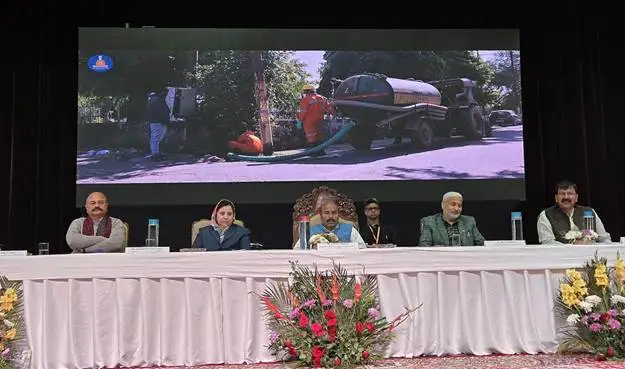Union Minister Dr. Virendra Kumar distributes PPE Kits

In a significant move to uplift the lives of sanitation workers, Union Minister for Social Justice and Empowerment, Dr. Virender Kumar, recently visited Jammu. His visit focused on the implementation of various schemes aimed at enhancing the welfare of marginalized communities in the Union Territory. During this event, the Minister distributed Personal Protective Equipment (PPE) kits and Ayushman health cards to Sewer and Septic Tank Workers (SSWs), also known as Safai Mitras. This initiative is part of the National Action for Mechanized Sanitation Ecosystem (NAMASTE) scheme, which seeks to provide dignity and empowerment to sanitation workers across urban India.
The NAMASTE Scheme: A Step Towards Dignity
The NAMASTE scheme was launched with a clear objective: to ensure the safety and dignity of sanitation workers. This initiative aims to empower Safai Karamcharis socially and economically. By providing them with essential resources, the government seeks to enhance their occupational safety. The scheme focuses on improving access to PPE kits, safety devices, and machinery, which are crucial for the well-being of these workers.
Sanitation workers often face hazardous conditions while performing their duties. The NAMASTE scheme addresses these challenges by providing training and capacity-building programs. This not only equips them with the necessary skills but also instills a sense of pride in their work. By recognizing the importance of their contributions, the government aims to change societal perceptions about sanitation work. The NAMASTE scheme is a vital step towards creating a more equitable society where every worker is valued and respected.
Importance of PPE Kits for Sanitation Workers
Personal Protective Equipment (PPE) kits play a crucial role in safeguarding the health of sanitation workers. These kits typically include masks, gloves, goggles, face shields, gowns, and shoe covers. Each item is designed to protect workers from potential health hazards and infections. For those working in environments like sewers and septic tanks, the risk of exposure to harmful substances is significant.
Providing PPE kits is not just about safety; it is also about ensuring that workers feel secure in their roles. When sanitation workers are equipped with the right protective gear, they can perform their duties more effectively. This, in turn, contributes to better public health outcomes. The distribution of PPE kits under the NAMASTE scheme is a testament to the government’s commitment to the welfare of these essential workers. It highlights the importance of investing in their safety and well-being.
Ayushman Health Cards: Access to Healthcare
In addition to PPE kits, the distribution of Ayushman health cards is another significant aspect of the Minister’s visit. The Ayushman health card is part of the Ayushman Bharat Pradhan Mantri Jan Arogya Yojana (AB-PMJAY), a government-sponsored health insurance scheme. This card provides beneficiaries with access to cashless and paperless healthcare services at empaneled hospitals.
The Ayushman health card serves as a vital identification tool for sanitation workers and their families. It contains essential information, including a unique identification number and details of covered healthcare services. By providing these cards, the government aims to ensure that sanitation workers have access to quality healthcare. This initiative is crucial, especially considering the health risks associated with their work. Access to healthcare not only improves their quality of life but also empowers them to focus on their jobs without the constant worry of medical expenses.
Commitment to Marginalized Communities
During his visit, Dr. Virender Kumar reaffirmed the government’s commitment to supporting marginalized communities. The event highlighted the principle of ‘Vanchiton Ko Variyata,’ which emphasizes prioritizing those who have been historically underserved. This dedication reflects the broader vision of ‘Viksit Bharat,’ where every individual has the opportunity to contribute to and benefit from India’s development journey.
The Minister’s visit also included a stop at the Outreach and Drop-In Centre (ODIC), run by the NGO ‘JK Society for the Promotion of Youth and Masses.’ This center operates under the National Action Plan for Drug Demand Reduction (NAPDDR) and focuses on providing support to vulnerable populations. The government’s collaborative efforts with NGOs and local organizations are essential in building a more equitable society. Through these initiatives, the Ministry of Social Justice and Empowerment aims to leave no one behind and ensure that every individual has the chance to thrive.
Observer Voice is the one stop site for National, International news, Sports, Editor’s Choice, Art/culture contents, Quotes and much more. We also cover historical contents. Historical contents includes World History, Indian History, and what happened today. The website also covers Entertainment across the India and World.

